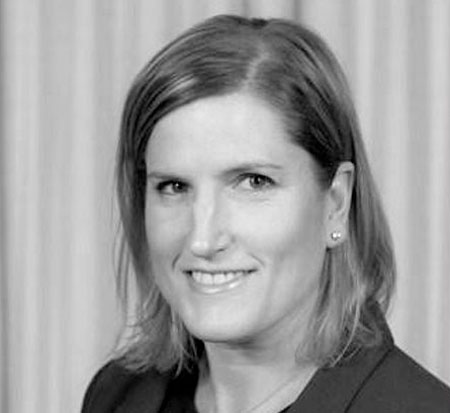Catherine Winner, MBA ’09, on Investment Stewardship and the ESG Myth
In a Gabelli School Investment Stewardship Series’ presentation sponsored by the CFA Society New York, the Gabelli Center for Global Security Analysis, and the Museum of American Finance in February, Winner shared her thoughts on the impact of corporate governance on a company and its shareholders, and why ESG is much more than a “feel-good” concept.


Catherine Winner, MBA ’09, on Investment Stewardship and the ESG Myth
In a Gabelli School Investment Stewardship Series’ presentation sponsored by the CFA Society New York, the Gabelli Center for Global Security Analysis, and the Museum of American Finance in February, Winner shared her thoughts on the impact of corporate governance on a company and its shareholders, and why ESG is much more than a “feel-good” concept.
Q: What does corporate governance mean to you?
A: We view corporate governance as the structure within which a company is managed—in other words, how a company is controlled and operated. Our belief is that sound corporate governance creates a framework that allows a company to be managed in the interest of shareholders and broader stakeholders. While the environmental and social components of ESG are increasingly high profile, we see strong governance practices as underlying it all and ultimately key to enabling progress on strategic issues.
Q: What are your thoughts on the myth that ESG and sustainability improvements are just “feel-good” concepts?
A: For us, ESG is not a feel-good issue. We believe that sound ESG practices can drive value creation and improve long term performance. When it comes to ESG, we take a materiality-based approach, which means that the ESG factors we look at vary based on the particulars of a given company, such as its industry, region and business model. The concept of materiality informs the way our team engages with companies. For example, it determines which topics we choose to engage on. To help guide companies through what disclosures we are looking for, we advocate for reporting in line with established ESG frameworks, such as the Sustainability Accounting Standards Board (SASB) standards and the Task Force on Climate-related Financial disclosures (TCFD) recommendations.
Q: How did the COVID-19 pandemic affect company engagement work, and what were some outcomes?
A: Our engagements related to COVID-19 have demonstrated that sustainability is not just about the environment—the social side is critical. Many companies have talked to us about the challenges and opportunities presented by a work from home model. On one hand, remote work may offer new workforce recruitment opportunities, and some companies say it has increased their ability to hire more diverse talent, as remote work unlocks new talent pools. But simultaneously, remote work presents new difficulties, like maintaining employee engagement and retention. We’ve also observed some companies proactively addressing the different kinds of cybersecurity risks that exist in remote work compared to the office setting.
Q: What is one key challenge in engaging with portfolio companies on climate change?
A: A key objective of our climate engagement program is to increase disclosure of emissions data. Since October 2020, we have engaged with 271 companies that we identified as not disclosing emissions data material to their business under the SASB standards to encourage them to increase disclosure. We’ve seen positive results so far, and we’re hopeful that these conversations, combined with the work of other stakeholders, will help drive greater disclosure, transparency, and accountability. To further this effort, beginning in 2022, where we have not seen improvements in emissions disclosure, we may vote against directors to encourage progress.
Q: What progress are you seeing at the board level in terms of diversity, equity, and inclusion?
A: We believe that board diversity is a business imperative, so over the past several years, we have sought to use proxy voting to encourage greater levels of board diversity. We are excited by some of the progress we’ve seen to date, with 68% of the 250 all-male US boards we voted against in 2019 having added at least one woman, and 27% of the 898 all-male boards we voted against globally in 2020 having done the same. But simultaneously, we recognize the need to discourage a “one-and-done” approach to gender diversity and to push for other forms of diverse representation, particularly ethnic diversity. So as of March 2022, we are expecting all boards globally to have at least 10% women, or to meet higher local market guidance. Further, we are expecting companies in the S&P 500 and FTSE 100 to have at least one director from an underrepresented ethnic minority group.
Q: What is the future of investment stewardship?
A: The stewardship field has evolved so much over the past few years. I think directionally, we are seeing a greater push to use investment stewardship as a tool to hold boards accountable. Proxy voting and engagement are key levers that we as shareholders have to effect positive change and to help companies improve on material ESG issues. This takes many different forms, from voting on director elections to direct engagement to industry collaboration, but overall, the expectation to use investment stewardship to drive sustainable, long-term improvements is growing, and we are excited to be part of the industry’s journey.